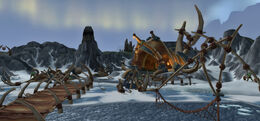 | |
| Type | Port |
| Race(s) |
|
| Language(s) | Tuskarr |
| Affiliation(s) | Contested between the Kalu'ak and the Kvaldir |
| Location | Borean Tundra, Northrend |
| Status | Contested |
| Sources: Wrath of the Lich King | |
Kaskala, a port located in the Borean Tundra in southwestern Northrend, is the capital of the tuskarr. The tuskarr capital is a collection of villages, none of them with more than 400 people but clustered so close together they create one larger unit. Kaskala's oldest village is at least several centuries old, and the rest grew up around it as family members split off to start their own smaller families. [1]
Wrath of the Lich King
Kaskala was originally going to be a neutral tuskarr town, but was later changed with the city besieged by the Kvaldir. The Tuskarr have taken refuge in Unu'pe a tuskarr village to the east.
Gallery
Kaskala's location in Lands of Mystery.
Lands of Mystery
This section describes the intact town before the kvaldir destroyed it.
Kaskala is the tuskarr homeland. It is a collection of villages, actually, none of them more than 400 people but clustered so close together they create one larger unit. Tuskarr are extremely family-focused, and each village is a single extended family, all connected by blood or marriage. You could look at Kaskala as a single city divided into family compounds, but that is not entirely accurate because each village runs itself. The males of each village hunt and fish while the females raise what few crops grow in the tundra, gather berries and roots, fashion and repair clothing and tend to the homes and the children.
Tuskarr houses are solidly built structures of wood and stone, with thick, thatched roofs. They are only one story and sprawl rather than rise, which makes sense given the incessant wind. Heavy shutters cover the windows and short entry halls lead from the outer door to an inner one, which keeps heat from escaping and cold from entering. Their homes are radial, with a single large chamber at the middle and the sleeping quarters arrayed around it. They have large pits in the center, lined with stone, and keep a fire blazing constantly — it heats the entire house and has spits and trays for cooking food.
Tuskarr are fishers and whalers, and they use every part of the animals they hunt. Whale bones form support beams in their homes, and heavy sealskins and other furs cover the floors and the doorways. They create dyes from various squid inks and fish scales, and have colorful weavings on their walls. Their inner clothing is bright as well, under their thick furs and oilskins. When a tuskarr woman accepts a man as her husband she weaves him a vest and he wears that against his skin. She replaces it once they have children, and again if he becomes the head of their extended family. She repairs it when necessary but otherwise he never takes it off. When males die they are buried in their most recent vest, and the others are wrapped together to fashion a pillow for the body.
As I said, each village is one extended family and handles its own affairs. The eldest male of the family is the village chief, and dictates where they fish and hunt and who handles which tasks. His wife oversees the women's activities and the children's education. The different villages trade together, swapping excess items for things they need.
Every tuskarr takes part in guarding Kaskala and patrolling the area for danger, but Tusklord Hrak'kar decides the schedule. He spreads the tasks evenly so no one village bears the brunt of any task or has too few men to bring in food. If one village has a poor week fishing, the others pool their resources and share their food. No one in Kaskala goes hungry or unclothed unless everyone does. That does not mean they share equally — if one village has more success at whaling than the others but everyone brings home enough to feed their own families, that one village keeps its spoils. Yet if someone is hungry, the village with the most is the first to share — tuskarr consider it a mark of honor to help support their people.[1]
Trivia
- Kaskala is an anagram for Alaska with an extra "k".
References
- ^ a b Lands of Mystery, pages 93-94




